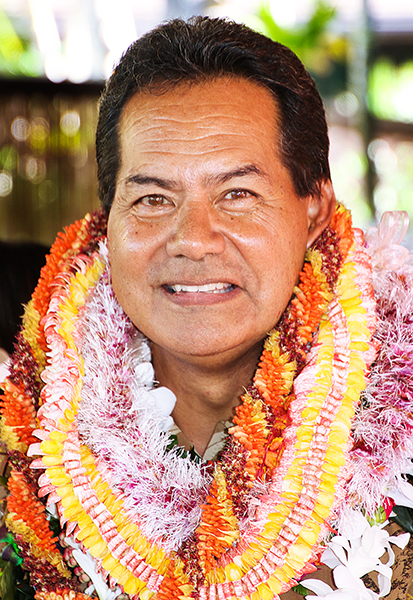
[Reprinted from a 2016 Polynesian Cultural Center Blog story]

Friends and colleagues honored Keith Kalanikau Awai, the Cultural Center’s most senior Hawaiian expert, during a special retirement luncheon held in the Gateway Terrace on March 4, 2016, after 43 years of service at the Polynesian Cultural Center.
Chants, hula, gift presentations — including a Maori rākau whakapapa to help him remember the progression of kumu hula — as well as jokes, laughs, tears, and of course, stories marked the occasion. For example:
- In introducing the program portion of the “graduation,” Kaipo Manoa, Hawaiian Village manager, said, “There are so many memories and stories to tell. There are a lot of people who want to share their aloha with you.”
Later, Manoa said he had gone looking for old photos of Awai, “but I couldn’t use them because he looks the same now as he did then.
We are fortunate in the kauhale [Hawaiian Village] to work every day with Keith. He is everything everyone says he is.”
- John Muaina, PCC vice president of Human Relations, described Keith as “…an individual with extraordinary gifts.” He pointed out that Keith graduated from Kamehameha in 1972, where he studied under the tutelage of Aunty Nona Beamer; and he came to work at the PCC that same year as a Hawaiian and Tahitian dancer. He also worked as a village demonstrator and assistant to Aunty Sally in 1973.”
“From the very start, those who associated with him knew he was an outstanding performer,” Muaina said. “Because of his expertise, the Center has used him in many areas over the years.”
- Shirlene Kilena Ostrov, a former member of Keith’s Halau O ‘Aulani in the Washington DC area starting in 1996, who now owns a logistics company, also came to Laie to pay her respects to her kumu:
“I’ve accompanied him to the nation’s capital. I’ve accompanied him to kindergartens. We have danced for five-year-olds, danced for our Office of Hawaiian Affairs trustees, our U.S. Congressional leaders, and he has lived and explained aloha to our entire community on the other side of the world.”
“I’m no longer a part of his group, but there are a bunch of us who absolutely love and adore him, and see him as the center of what we are there in Washington DC.”
“I represent hundreds of people on the other side of the world who are so thankful for what you do,” Ostrov said.
She also made a monetary donation [to the Haleiwa LDS ward] “as a small gesture for what you do in our nation’s capital. We are forever grateful.”
- Delsa Atoa Moe: “Keith has touched my life deeply,” she said, recalling she first came to BYU–Hawaii in 1978, and the next year joined the Theater Department for the rest of her college life.
Moe said “by some miracle” she passed her Hawaiian section audition for Keith, “and that was the beginning of my being Hawaiian,” she joked. “I learned so much from Keith. Thank you for teaching this non-Hawaiian girl how to enjoy and love hula.”
“He was always fair. It didn’t matter if you were his friend, if you were Hawaiian, he was always fair. He taught everybody the same, and he had the same expectations.”
Moe said three words come to mind as she describes Awai: “Dependability,
service and integrity. In everything Keith did, he had integrity, whether it was in keeping his culture intact, his work ethic, or his relationships. Thank you, Keith, for being a great example. We love you.”
- “Hula sister” Ellen Gay Dela Rosa said of her long-time friend, “We could tell you stories, but like hula, the stories are in the hands,” as she invited all the former Theater dancers in the crowd to the front to do a hula for Awai. “This is for the legacy that Keith has left.”
Awai soon joined the group, and then stayed to do the Sweetheart Hula duet with Ellen Gay.
- Steve Lāulu reminisced about dancing as a student with Keith in the early 1970s. Paraphrasing Maya Angelou’s remark about people remembering how you made them feel, said “that’s how I feel about Keith. He’s a great example.”
- As Alfred Grace, President and CEO of the Polynesian Cultural Center next came to the microphone, Keith — accompanied by his mother, Aunty Kanani and brother-in-law — wore so many leis he could barely see over the top of them.
On behalf of the Presidents Council and the PCC Board of Directors, Grace presented Awai with a lifetime pass to PCC; and then he recalled a time when Keith — then Theater manager — had corrected his wife, Valerie, who was a dancer at the time. “What I learned from my wife was, he treated everyone fairly. He treated everyone with equal amounts of respect, and he also let them know how much he loved and appreciated them.”
“Keith was very good at letting you know what he thought about all of you.
Not just you in a moment. He never judged you by an action you had just made. He might scold you, but you always recognized that he never forgot the whole person, all of you.”
“I learned from my wife that, even though she had just gotten a big scolding from Keith, she knew he saw her for the entire person she was, and not just for that moment. I think that’s one of the greatest lessons I’ve ever learned from you,” Grace said.
“You appreciate people for being children of our Heavenly Father. Thank you for always being the epitome of the aloha spirit.”
Grace also recalled traveling with Keith on promos and mentioned a particular one to northern California: “I was amazed to learn the former Theater manager was coming, and he was coming as a dancer. I remember how well Keith made us feel, not only because he was an excellent performer, but because he would sing the most beautiful songs in the mini-bus that that we were driving all around. There was always a beautiful feeling and spirit in that bus.”
Grace said no one should be surprised that Keith is “featured prominently in quite a few” of the new PCC training videos that build on traditional Polynesian values and concepts.”
“They’re not necessary about the ‘what we do’ at all, they’re about the ‘why we do things’ and how we choose to do them, and why this place is special, and how we’re supposed to treat each other.”
“I can’t think of anyone better than Keith Awai to be one of the featured presenters in those videos,” Grace continued. “You are a legacy; you are a legend here at the PCC.”
“On behalf of the President’s Council and the Board of Directors, thank you for everything you’ve done for the Polynesian Cultural Center.”
Responding, Awai said, “I came to the Center as a dancer, and I’m going out as a dancer. How can you thank a place that has been so generous to you? A lot of people can say, ‘I’m a Polynesian dancer…, but when you say I dance at the Polynesian Cultural Center, the name of this place gives us clout.”
“We have an obligation to this place to keep it at its top. That would be my challenge to all of you who remain.”
“Make sure what we have is always the best. We’re far from perfect. We all have our challenges; but all those who came before us have created a name that is very prominent. Let’s try to keep it that way.” Awai then performed a solo hula.
Asked what he’s going to do now, Awai replied, “I’m going to be a judge for the Merrie Monarch Festival in Hilo. I have a hālau on the mainland and in Japan, and I go to Kalaupapa, so I’m busy until May. After that, it’s open,” he said.
Story and photo by Mike Foley, who adds his own tribute by recalling even years earlier he knew Keith was a terrific hula dancer and kumu, but was pleasantly surprised how well he performed one day when he watched Keith join a Tongan Village cultural day celebration as a dancer. “I shouldn’t have been surprised, but of course, Keith was a great Tongan dancer, too.”

